the history of yeovil's pubs
PUBS HOME PAGE |
PUBS INTRODUCTION |
PUBS BY NAME |
BEERHOUSES |
Britannia Inn (2)
26 Vicarage Street
The Britannia Inn (marked 'A' on the map below) was originally a fine 17th century two-storey brick house with stone and ashlar to the front elevation with a double-storey projecting bay. It served as a public house from 1861 - after the closure of the Britannia Inn listed in Belmont / Park Street from 1842 to 1861.
The Britannia Inn in Vicarage Street was initially run by William Gaylard from the early 1860's and he is mentioned in the Minutes of the Volunteer Fire Brigade following a fire at the Britannia in 1865 (see Documentation below). A further fire in 1880 completely destroyed the Britannia Inn although it was rebuilt later.
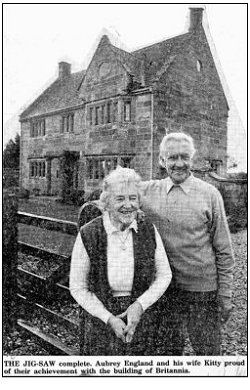 It is
interesting to
note that the
Minutes of the
Volunteer Fire
Brigade,
following the
August 1880
fire, elected to
charge Mr J
Brutton for
attending the
fire. John
Brutton was the
owner of
Brutton's Yeovil
Brewery and this
entry clearly
indicates that
the Britannia
Inn was a tied
house that
actually
belonged to the
brewer.
It is
interesting to
note that the
Minutes of the
Volunteer Fire
Brigade,
following the
August 1880
fire, elected to
charge Mr J
Brutton for
attending the
fire. John
Brutton was the
owner of
Brutton's Yeovil
Brewery and this
entry clearly
indicates that
the Britannia
Inn was a tied
house that
actually
belonged to the
brewer.
This version of the Britannia Inn was demolished, brick by brick, in 1969, to make way for access to the goods entrances of stores in Middle Street, and to the Vicarage Street car park (the compulsory purchase order for the car park was prepared in 1962). The materials used to build a private house at Ash (see photograph left). This newspaper cutting of the early 1970's showing the Britannia Inn rebuilt (and somewhat extended) at Ash with the new owners, Aubrey and Kitty England.
![]()
In 1861 William Gaylord (or Gaylard) was a 43-year old Martock-born glove cutter living in Vicarage Street with his wife, Sarah, their six children and a couple of lodgers but within five years he was the first licensee of the newly-opened Britannia Inn. In the 1871 census William, Sarah and two of their children are living at the Britannia Inn with just one lodger, a 24-year old unmarried glover by the name of John Kibby. William was described as a glover and beerhouse keeper but I really don't think the Britannia was ever a beerhouse and must have been a brewery-owned premises with a full public house license from the very beginning. The 'beerhouse keeper' is simply another example of sloppy categorisation by a census enumerator. William and Sarah then disappear from the records.
Yeovil-born John Kibby was the son of Mary Kibby but his father is unknown. In 1841 Mary Kibby was living in Wellington Street with her sons James, age 4, and Samuel, age 3. Ten years later she was still in Wellington Street, listed as a widowed laundress and living with the two boys plus John, aged 9, and Mary, aged 4. The family was still there in 1861 although by this time James had moved on and John was listed as a glover aged 18. By 1871, as seen above, John was boarding at the Britannia Inn and ten years later he was its licensee. By this time John was married to Emily and lived at the Britannia with their two daughters and son plus John's older brother James who was described as a 42-year old unmarried pensioner. By 1891 John and Emily were living at 53 Kiddles Lane (Eastland Road) with their four children and John was at this time listed as a stone cutter.
The next licensee, William Bicknell, had enjoyed a career as a Royal Marine and in the 1861 census was listed as a Royal Marine private at sea aboard HMS Trafalgar, a 120-gun first rate ship of the line of the Royal Navy, launched on 21 June 1841 at Woolwich Dockyard. She was the last to be completed of the successful Caledonia class. The ship was named by Lady Bridport, niece of Lord Nelson at the request of Queen Victoria, who with Prince Albert also attended the launch. The wine used was some kept from HMS Victory after returning from Trafalgar. Five hundred people were on board the ship at the time of its launch, of whom 100 had been at Trafalgar. William had been born in East Chinnock in 1827 and his wife, Elizabeth, was born in Haselbury Plucknett. In the 1871 census they were listed as living in Haselbury and William was described as a Plymouth Pensioner. By 1875 he was licensee of the Quicksilver Mail and in 1881 he was running the Heart of Oak in Huish. By the time of the 1891 census he was licensee of the Britannia Inn with Elizabeth. By 1901 William had died and Elizabeth was alone and 'living on her own means' in Orchard Street.
 Joseph Chant was
born in
Sherborne around
1866, the son of
Philip and
Mahala Chant. In
1871 and 1881
Philip, who was
a chimney sweep,
was living with
his family at
his
father-in-law's
house in
Sherborne. The
father-in-law,
Joseph Coles,
was also a
chimney sweep so
it is no
surprise that
Joseph Chant
became a sweep
too. By 1901
Joseph was
living at 82
Middle Street
with Jane Burgo,
some 12 years
his senior, and
their baby
daughter, Mary
Mahala. Again,
Joseph described
his occupation
as sweep. By
1898 Joseph was
advertising
himself in
Whitby's Yeovil
Almanack
Advertiser for
the Britannia,
of which he was
now licensee,
and advertising
himself as a
'Practical
Sweep, Dealer in
Turf, etc.' By
the time of the
1901 census
Joseph and Jane
had married,
were living at
the Britannia
and Joseph was
listed as a
publican and
sweep. Joseph,
Jane and Mary
were still all
living at the
Britannia in
1911 and Joseph
placed his last
advert in
Whitby's in
1912. By 1914
the Britannia
Inn had a new
landlord.
Joseph Chant was
born in
Sherborne around
1866, the son of
Philip and
Mahala Chant. In
1871 and 1881
Philip, who was
a chimney sweep,
was living with
his family at
his
father-in-law's
house in
Sherborne. The
father-in-law,
Joseph Coles,
was also a
chimney sweep so
it is no
surprise that
Joseph Chant
became a sweep
too. By 1901
Joseph was
living at 82
Middle Street
with Jane Burgo,
some 12 years
his senior, and
their baby
daughter, Mary
Mahala. Again,
Joseph described
his occupation
as sweep. By
1898 Joseph was
advertising
himself in
Whitby's Yeovil
Almanack
Advertiser for
the Britannia,
of which he was
now licensee,
and advertising
himself as a
'Practical
Sweep, Dealer in
Turf, etc.' By
the time of the
1901 census
Joseph and Jane
had married,
were living at
the Britannia
and Joseph was
listed as a
publican and
sweep. Joseph,
Jane and Mary
were still all
living at the
Britannia in
1911 and Joseph
placed his last
advert in
Whitby's in
1912. By 1914
the Britannia
Inn had a new
landlord.
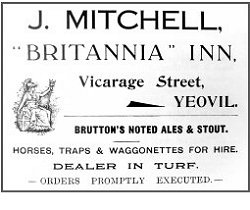 The new licensee
was Job
Mitchell. Job
was born in
Fordington, near
Dorchester,
Dorset, around
1868. He was the
son of a
journeyman
blacksmith,
Joseph Mitchell,
and his wife,
Sarah. Between
1897 and 1912
Job was licensee
of the
Wellington Inn
in Wellington
Street.
The new licensee
was Job
Mitchell. Job
was born in
Fordington, near
Dorchester,
Dorset, around
1868. He was the
son of a
journeyman
blacksmith,
Joseph Mitchell,
and his wife,
Sarah. Between
1897 and 1912
Job was licensee
of the
Wellington Inn
in Wellington
Street.
In the 1901 census he described his occupation as carpenter and inn keeper and lived in the Wellington with his wife, Sarah, and their three children and by the 1911 census the only difference was that Job described his occupation as carpenter. By 1914 he was licensee of the Britannia Inn, where he was to remain until at least 1923. His son, Earle Mitchell, was killed in action in Egypt in 1917.
map
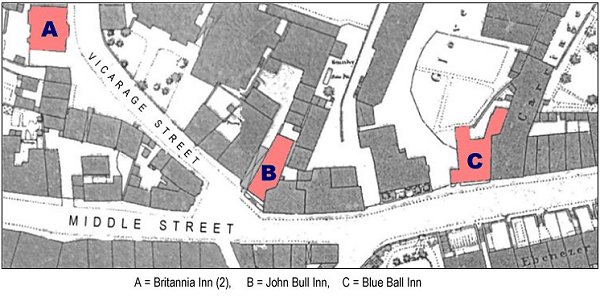
Gallery
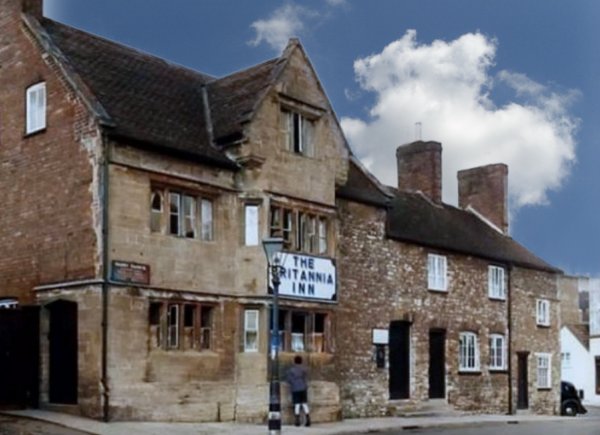
This colourised photograph
features in my
book "A-Z
of Yeovil"
The Britannia Inn, in a photograph of 1942.
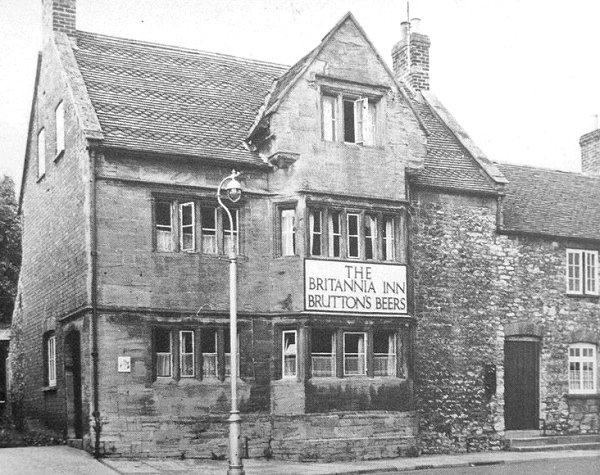
The Britannia Inn photographed in the mid-1960's.

From the Cave
Collection
(colourised),
Courtesy of South Somerset Heritage Collection
A mid-distance photograph of the Britannia Inn and adjoining cottages taken about 1968.
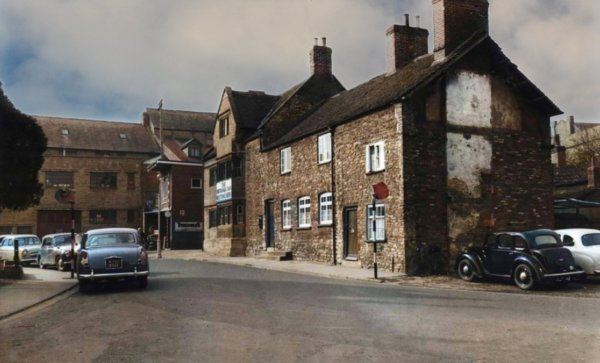
From the Cave
Collection
(colourised),
Courtesy of South Somerset Heritage Collection
... and seen from the opposite direction, again in the 1960s.
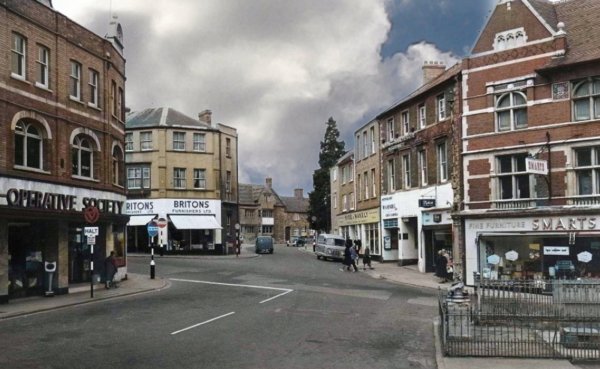
From the Cave
Collection
(colourised),
Courtesy of South Somerset Heritage Collection
This photograph, taken about 1968, shows the location of the Britannia Inn in relation to remaining buildings - at left the old Co-Operative store and offices (later Porter Blacks) next is the entrance to Middle Street, Britons shop was the Woolwich Building Society and is now a bookmakers, at centre is the entrance to Vicarage Street and the building with the white rectangle is the Britannia Inn. To the right are buildings still existing and now occupied by the Abbey Building Society, at far right is the Coronation Hotel & Vaults in front of which are the underground toilets, now the location of the bandstand.
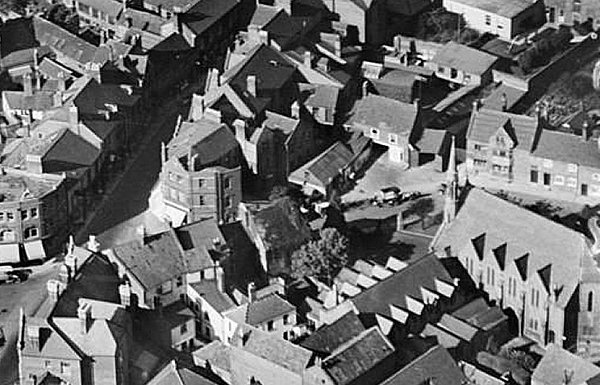
A 1928 aerial view of the junction of Vicarage Street (running across the centre of the photo) and Middle Street (running from bottom left towards centre top). At lower right is the Methodist church and above it, next to the spire, is the Britannia Inn.
licensees
1861 – William
Gaylard – Beer
Retailer
(Kelly's 1861
Directory)
1865 – William
Gaylard
(Volunteer Fire
Brigade Minutes)
1866 – William
Gaylard – Beer
Retailer (1866
Post Office
Directory)
1866 – William
Gaylard – Beer
Retailer
(Kelly's 1866
Directory)
1871 – William
Gaylord – Glover
& Beer House
Keeper (1871
census) listed
as Britannia Inn
1872 – William
Gaylard – Beer
Retailer
(Kelly's 1872
Directory)
1875 – William
Gaylard – Beer
Retailer (1875
Post Office
Directory)
1875 – William
Gaylard – Beer
Retailer
(Kelly's 1875
Directory)
1881 – John
Kibby –
Innkeeper (1881
census) listed
as the Britannia
Inn at 25
Vicarage Street
1891 – William
Bicknell –
Publican (1891
census)
1895 – William
Bicknell – Beer
Retailer
(Kelly’s 1895
Directory) pub
not named
1898 – Joseph
Chant (Whitby's
1898 Yeovil
Almanack
Advertiser)
listed as
Britannia Inn
1901 – Joseph
Chant – Publican
& Sweep (1901
census)
1911 – Joseph
Chant – Publican
& Chimney Sweep
(1911 census)
1912 – Joseph
Chant (Whitby's
1912 Yeovil
Almanack
Advertiser)
listed as
Britannia Inn
1914 – Job
Mitchell – Beer
Retailer
(Kelly’s 1914
Directory) pub
not named.
1915 – Job
Mitchell
(Whitby's 1915
Yeovil Almanack
Advertiser)
listed as 26
Vicarage Street
1919 – Job
Mitchell
(Whitby's 1919
Yeovil Almanack
Advertiser)
listed as 26
Vicarage Street
1923 – Job
Mitchell – Beer
Retailer
(Kelly’s 1923
Directory) pub
not named
1929 – G Ransome
– see next item
1929 – LA
Higglesdon –
License transfer
(Borough Petty
Sessions,
October)
1935 – Arthur
Baker (Kelly's
1935 Directory -
Beer Retailers)
listed as 26
Vicarage Street
1938 – AE Baker
(1938 Yeovil
Directory)
listed as
Britannia
1939 – Harry
Harris (Kelly’s
1939 Directory)
listed as
Britannia Inn
1949 – H Harris
(Kelly’s 1949
Directory)
listed as
Britannia
1955 – H Harris
(1955 Yeovil
Directory)
documentation
|
1865 |
Fire at the Britannia Inn, Oct 2/65. Alarm of fire at 3am in Vicarage Street at the Britannia Inn occupied by Mr Gaylard - the Brigade called - the Engine taken out but not used., several members attended. (Volunteer Fire Brigade Minutes)
|
|
1880 |
Sept
2nd.
Proposed
by Mr
Moffat
that
£7.10.0
be
Charged
to Mr J
Brutton
for
attendance
at the
Fire in
Vicarage
Street,
Yeovil,
August
25th-26th.
Seconded
by Mr
Damon.
Carried.
(Volunteer
Fire
Brigade
Minutes) |
|
1948 |
Grade
III - No
26
Vicarage
Street -
Britannia
Inn.
|